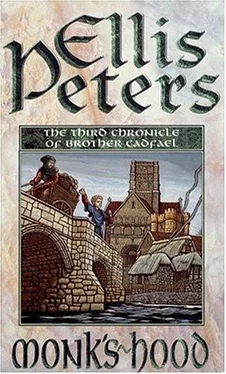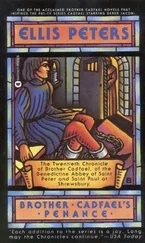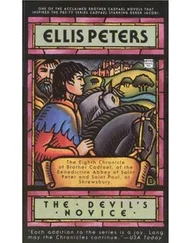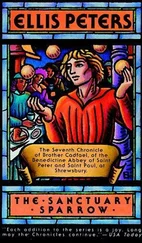“I do not understand you, brother,” said the judge patiently. “Explain yourself. You spoke of an impediment.”
“I am a Welshman,” said Cadfael. “I endorse and approve the law of Wales, that says a son is a son, in or out of marriage, and has the same rights though English law may call him a bastard. Yes, a son born out of wedlock may inherit—but not a son who has murdered his father, as this man has.”
He expected uproar, and instead there was such a silence as he had seldom known. The three judges sat rigid and staring, as though turned to stone, and every breath in the church seemed to be held in suspense. By the time they all stirred out of their daze, and turned almost stealthily, almost fearfully, to look at Meurig, he had regained his colour and his hardihood, though at a price. Forehead and high cheekbones had a wet sheen of sweat, and the muscles of his neck were drawn like bow-strings, but he had himself in hand again, he could look his accuser in the face, refrain from hurling himself upon him, even turn from him with dignity and calm to look at the judges, in eloquent protest against a charge he disdained to deny except by silent contempt. And probably, Cadfael reflected ruefully, there are some here who will take for granted that I am an agent sent by my order to prevent, or at least delay, the surrender of Mallilie to its rightful owner. By any means, however base, even by accusing a decent man of murder.
“This is a most grave charge,” said the presiding judge, formidably frowning. “If you are in earnest, you must now stand to it, and make good what you have said, or withdraw.”
“That I will do. My name is Cadfael, a brother of Shrewsbury, and the herbalist who made the oil with which Gervase Bonel was poisoned. My honour is involved. The means of comfort and healing must not be used to kill. I was called to attend the dying man, and I am here now to demand justice for him. Allow me, if you will, to tell you how this death befell.”
He told the story very baldly, the narrow circle of those present, of whom one, the stepson, seemed then to be the only one with anything to gain from the death.
“Meurig, as it seemed to us, had nothing to gain, but you and I have now seen how much, indeed, was at stake for him.
The agreement with my abbey had not been completed, and by Walsh law, which we had not understood could be invoked in the matter, he is the heir. Let me tell you his story as I see it. Ever since he grew a man he has been well aware that by Welsh law his position as heir was unassailable, and he was well content to wait for his father’s death, like any other son, before claiming his inheritance. Even the will Gervase Bonel made, after his second marriage, making his stepson his heir, did not trouble Meurig, for how could such a claim stand against his right as a true son of the man’s blood? But it was a different case when his father granted his manor to the abbey of Shrewsbury in return for housing, food and comfort for life, after the usual fashion of such retirements. I do believe that if that agreement had been completed and sealed at once, all would have been over, and this man would have grown reconciled to his loss and never become a murderer. But because my abbot was summoned away to London, with good reason to think that another may be appointed in his place, he would not complete the charter, and that respite caused Meurig to hope again, and to look about him desperately for the means to prevent it ever being completed. For, see, if the abbey ever established its legal right by final ratification, his position at law would have been hopeless. How could he fight Shrewsbury abbey? They have influence enough to ensure that any suit should be tried in an English court and by English law, and by English law, I acknowledge it with regret and shame, such children as Meurig are deprived, and cannot inherit. I say it was mere chance, and that resulting from an act of kindness, that showed him where to find the means to kill, and tempted him to use it. And great pity it is, for he was never meant to be a murderer. But here he stands in his guilt, and must not and cannot enter into possession of the fruit of his crime.”
The presiding judge sat back with a heavy and troubled sigh, and looked at Meurig, who had heard all this with a motionless face and a still body. “You have heard and understood what is charged against you. Do you wish now to answer?”
“I have nothing to answer,” said Meurig, wise in his desperation. “This is nothing but words. There is no substance. Yes, I was there in the house, as he has told you, with my father’s wife, the boy her son, and the two servants. But that is all. Yes, by chance I have been in the infirmary, and did know of this oil he speaks of. But where is there any thread to link me with the act? I could as well put forward the same story against any of those in that household that day, and with as little proof, but I will not. The sheriff’s officers have held from the beginning that my father’s stepson did this thing. I don’t say that is true. I say only that there is no proof to entangle me rather than any other.”
“Yes,” said Cadfael, “there is such proof. There is one small matter that makes this crime all the more grievous, for it is the only proof that it was not all impulsive, done in an angry instant and regretted after. For whoever took away a portion of my monk’s-hood oil from our infirmary must have brought with him a bottle in which to put it. And that bottle he had to conceal afterwards, as long as he was observed, but dispose of as soon as he privately might. And the place will show that it could not have been put there by the boy Edwin Gurney, Bonel’s stepson. By any other of the household, yes, but not by him. His movements are known. He ran straight from the house to the bridge and the town, as there are witnesses to declare.”
“We have still nothing but words, and deceptive words, too,” said Meurig, gaining a little confidence. “For this bottle has not been found, or we should have known it from the sheriff’s men. This is a whole-cloth tale compounded for this court alone.”
For of course he did not know; not even Edwin knew, not even Hugh Beringar, only Cadfael and Brother Mark. Thank God for Brother Mark, who had done the finding and marked the place, and was in no suspicion of being anyone’s corrupted agent.
Cadfael reached into his pouch, and brought forth the vial of flawed green glass, unwrapping it carefully from the napkin in which it was rolled. “Yes, it has been found. Here it is!” And he held it out sharply at the full stretch of his arm into Meurig’s appalled face.
The instant of sick disintegration passed valiantly, but Cadfael had witnessed it, and now there was no shadow of doubt left, none. And it was a piercing grief to him, for he had liked this young man.
“This,” said Cadfael, whirling to face the bench, “was found, not by me, but by an innocent novice who knew little of the case, and has nothing to gain by lying. And it was found—the place is recorded—in the ice of the millpond, under the window of the inner room of that house. In that room the boy Edwin Gurney was never for one moment alone, and could not have thrown this out from that window. Inspect it, if you will. But carefully, for the marks of the oil are there in a dried stream down one outer side of the vial, and the dregs are still easily identifiable within.”
Meurig watched the small, dreadful thing being passed among the three in its napkin, and said with arduous calm: “Even granted this—for we have not the finder here to speak for himself!—there were four of us there who could well have gone in and out of that inner room the rest of the day. Indeed, I was the only one to leave, for I went back to my master’s shop in the town. They remained there, living in the house.”
Читать дальше












